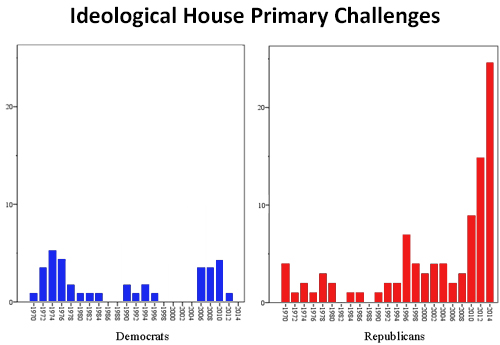 Matt Yglesias draws my attention to a paper written after the 2014 elections that looks at the number of ideologically based primary challenges in House elections since 1970. It turns out that there have always been plenty of primary challenges, but most of them are mundane affairs based on local issues. Until recently, very few have been about insufficient liberal or conservative purity. Here’s the nut of it:
Matt Yglesias draws my attention to a paper written after the 2014 elections that looks at the number of ideologically based primary challenges in House elections since 1970. It turns out that there have always been plenty of primary challenges, but most of them are mundane affairs based on local issues. Until recently, very few have been about insufficient liberal or conservative purity. Here’s the nut of it:
The majority of congressional primary challenges are motivated by idiosyncratic failings of the incumbent — factors such as scandals, the incumbent’s age, or the incumbent’s alleged incompetence. Ideological challenges…constitute an average of just under 14 percent of primary challenges.
….The number of ideological challenges, however, has increased steadily over the past five election cycles, and was at an historic high in 2014. This is entirely due to challenges within the Republican Party; not a single Democratic primary challenger based his or her campaign on the claim that the incumbent was insufficiently liberal….This is noteworthy not only for what it says about conflict within the Republican Party, but for what it says about the lack of conflict among Democrats.
Even in the post-Watergate elections, Democrats never mounted more than a handful of ideological primary challenges. The Gingrich revolution in the mid-90s was similar on the Republican side. It’s only starting in 2010—the Obama era—that ideological primary challenges suddenly skyrocketed in the Republican Party.
Yglesias writes that “the Bernie Sanders campaign appears to suggest the existence of substantial untapped demand for left-wing ideological primary challenges in the Democratic Party.” Maybe. More likely, given the 40-year history of neither party mounting many ideological primary challenges, something very unusual happened among conservatives in 2010. As much as they hated Bill Clinton, he never prompted a tidal wave of right-wing challenges to Republican incumbents. But something about Obama was different. Suddenly an awful lot of Republicans decided that their party needed to get a lot more conservative.
What was it about Obama that was so different? I think we can all take a guess. But whatever the answer, I’ve seen no indication of anything similar happening among Democrats. And Bernie’s millennial supporters, as usual, show very little interest in any election less important than the presidency. So my money is on Democrats never having more than a few ideological challenges per election cycle. Bernie is Bernie, not a harbinger of deep discontent among liberals.
But I can be proven wrong pretty easily. All it takes is a dozen or two primary challenges. Let’s see ’em.

















